-
Welcome to rpgcodex.net, a site dedicated to discussing computer based role-playing games in a free and open fashion. We're less strict than other forums, but please refer to the rules.
"This message is awaiting moderator approval": All new users must pass through our moderation queue before they will be able to post normally. Until your account has "passed" your posts will only be visible to yourself (and moderators) until they are approved. Give us a week to get around to approving / deleting / ignoring your mundane opinion on crap before hassling us about it. Once you have passed the moderation period (think of it as a test), you will be able to post normally, just like all the other retards.
You are using an out of date browser. It may not display this or other websites correctly.
You should upgrade or use an alternative browser.
You should upgrade or use an alternative browser.
The Random Adventure Game News Thread
- Thread starter Jaesun
- Start date
Life of the Party
Arcane
- Joined
- May 8, 2018
- Messages
- 3,535
Boleskine
Arcane
- Joined
- Sep 12, 2013
- Messages
- 4,045
https://www.pcgamer.com/amnesia-the-dark-descent-will-be-even-harder-from-next-week/
Amnesia: The Dark Descent will be even harder from next week
Come die with me.
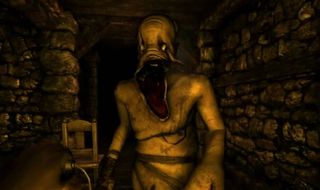
Frictional Games has announced that Amnesia: The Dark Descent will be getting a "hard mode" on September 28.
In a move that's a huge contrast to the Safe Mode, introduced to Frictional's SOMA, a couple of years ago, Amnesia will now be even more challenging. According to Frictional, the new beefed up difficulty will make it "a little harder to beat the game."
The changes from the original difficulty mean autosaves will be disabled, manual saving will cost four tinderboxes, losing all sanity will result in death, and oil and tinderboxes will be more hard to come by.
And if that's not enough to get you crying into your keyboard, monsters will be able to locate you more easily, they'll be faster when they do, and are likely to make shorter work of you as their damage has also been increased. They'll stick around for longer too, presumably to bask in your misery and/or death. Yikes.
Completing the game on Hard mode will net you a sparkly, new trophy, aptly called 'Masochist'. You'll be able to choose between 'normal' and 'hard' mode when starting a new game but will be unable to switch part-way through, so choose carefully.
LESS T_T
Arcane
- Joined
- Oct 5, 2012
- Messages
- 13,582
![The Year of Incline [2014] Codex 2014](/forums/smiles/campaign_tags/campaign_incline2014.png)
Sumatra: Fate of Yandi, a point and click adventure set in Indonesia:
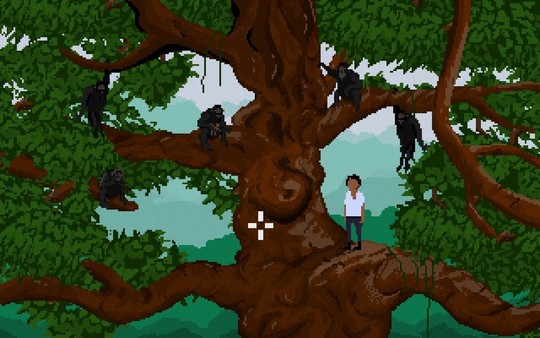
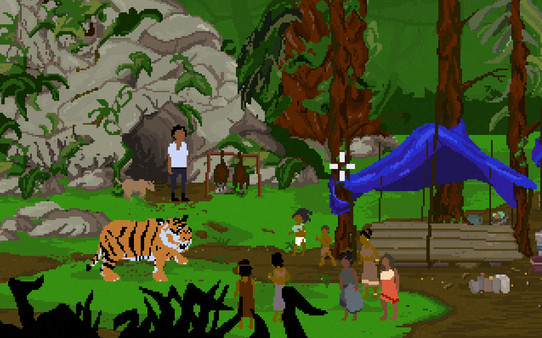


You are Yandi, a villager who works for the Pandang Logging Company deep in the Sumatran jungle. Your journey begins when a dramatic accident leaves you stranded and alone in the jungle. You must survive, you must find help - you must escape! But who knows what you might come across in the process?
Features:
- An old school point and click adventure aesthetic with puzzles galore and an intriguing storyline
- A range of interesting characters to encounter along the way... both human and animal, friend and foe
- A variety of unfolding mysteries to keep Yandi on his toes
- Original ambient soundtrack
- Over 100 backgrounds to explore
- A nostalgic style that harks back to the early Sierra/LucasArts days - with some modern twists
Inspiration?
Old school point and click adventures from the 80s and 90s and the nature and legends of Indonesia.
- Joined
- Mar 21, 2013
- Messages
- 491




Sumatra: Fate of Yandi, a point and click adventure set in Indonesia:

Legend of Hand was great, hopefully the 'traditional' art style gets them some more press.
CryptRat
Arcane

- Joined
- Sep 10, 2014
- Messages
- 3,626
I missed that : https://steamcommunity.com/games/581360/announcements/detail/1690428894661061007
Autumn came and brought some good news!
12 septembre - Artem Vodoriz
Hey, Foxies ! Autumn came and brought some good news! The second chapter of Leah's adventures is releasing in November . Everyone who has already bought FoxTail will get it with the autumn update!
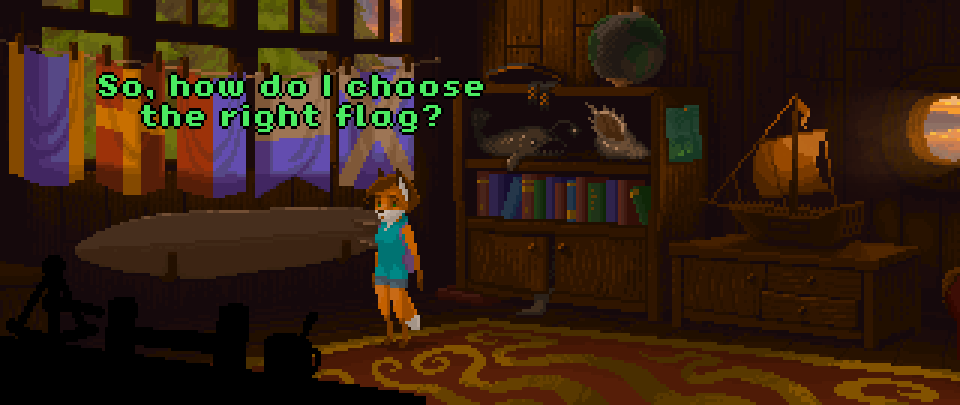
Life of the Party
Arcane
- Joined
- May 8, 2018
- Messages
- 3,535
Deliver Us The Moon is set in the near future where Earth's natural resources are depleted. In an effort to solve the energy crisis, global powers created the World Space Agency and secured a promising new source of energy on the moon. The World Space Agency colonized and operated from the moon until one fateful night all communications with Earth ceased and the energy source was lost. Now, years later, you assume the role of Earth's last astronaut to go on a do-or-die mission to investigate what happened and save humanity.
During this adventure, your only companion is a small robot named ASE. Together you will traverse the moon, explore abandoned facilities, gather clues and ultimately uncover the secrets and hidden agendas that are at play. Only by relying on your wits will you have a chance at successfully delivering the moon!
Key Features:
NARRATIVE EXPLORATION
Ruins of previous lunar missions have many stories and secrets to tell.
Use your Astronaut equipment to uncover the history of the lunar colony.
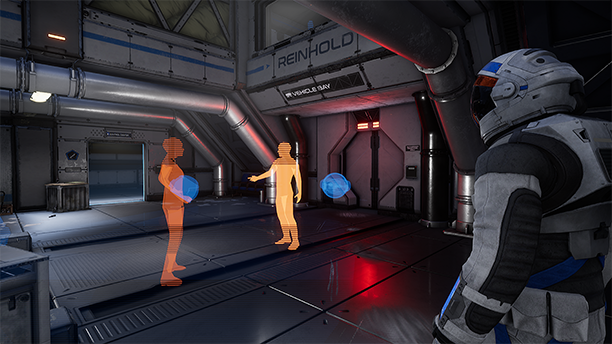
NAVIGATE HAZARDS
There is no oxygen in space and malfunctioning systems litter the lunar landscape.
Surviving these hazards require an adventurer's mind.
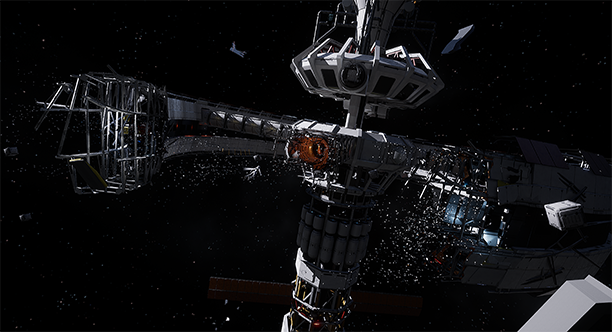
ENVIRONMENTAL PUZZLES
The lunar bases have fallen into disrepair and have become a challenge to navigate.
Unlock tools to overcome obstacles and dangers blocking your path.
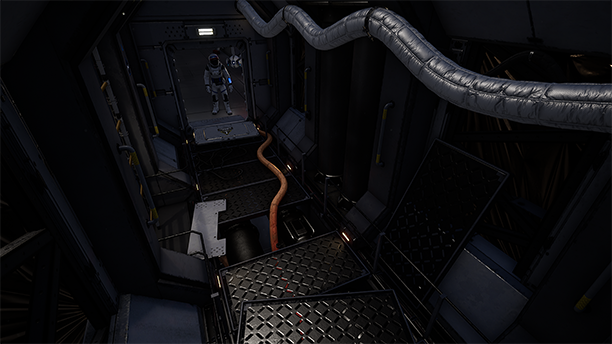
PLAY ON THE MOON
Float around in space and glide across the lunar landscape.
Experience weightless freedom and traverse the moon by foot, rover and monorail.
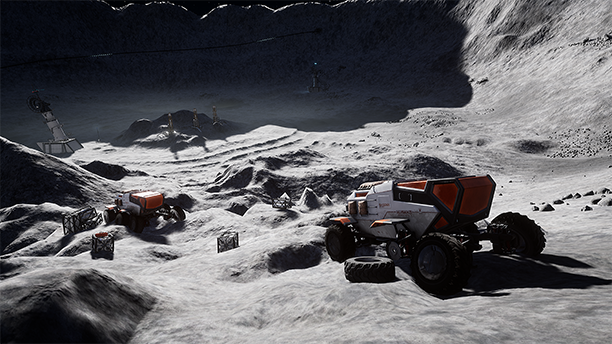
- Joined
- Jan 28, 2011
- Messages
- 100,695















Hah, getting pretty modern - the Digital Antiquarian does Indiana Jones and the Fate of Atlantis: https://www.filfre.net/2018/09/indi...s-and-games-and-whether-the-twain-shall-meet/
Excerpt:
Excerpt:
The game known as Indiana Jones and the Fate of Atlantis hits all the notes familiar to anyone who has seen an Indiana Jones film. It seems that the mythical Atlanteans were quite a clever lot, having harnessed energies inconceivable to modern scientists. The Nazis have gotten wind of this, and are fast piecing together the clues that will let them find the undersea site of Atlantis, enter it, and take the technology for themselves, thereby to conquer the world. It’s a fine premise for a globetrotting story of thrills and spills — silly but no more silly than any of those that got made into movies. There’s even a female sparring partner/love interest for Indy, just like in the films. This time her name is Sophia, and she’s a former archaeologist who’s become a professional psychic, much to the scientific-minded Indy’s dismay. Let the battle of barbs begin!
Barwood’s first interactive script really is a good one, with deftly drawn plot beats and characters that, if not exactly deep, nobly fulfill their genre-story purposes as engines of action, tension, or comic relief. Other game writers of the early 1990s weren’t always or even usually all that adept at such basic techniques of fiction as “pacing, tension, and character.” To see how painful a game can be that wants to be like the Indiana Jones movies but lacks the writers to pull it off, one need look no further than Dynamix’s Heart of China, with its humor that lands with the most leaden of thuds, its hero who wants to be a charming rogue but misplaced his charm, and its dull supporting characters who are little more than crude ethnic stereotypes. When you play Fate of Atlantis, by contrast, you feel yourself to be in the hands of a writer who knows exactly what he’s doing.
That said, the degree to which India Jones and the Fate of Atlantis is truly cinematic can be and too often is overstated. Games are not movies — an obvious point that game developers of the early 1990s frequently lost sight of in their rush to make their interactive movies. Hal Barwood, the Hollywood veteran brought into Lucasfilm Games to apply his cinematic expertise, was ironically far more aware of this fact than were many other game designers who lacked his experience in the medium they were all so eager to ape. Speaking to the science-fiction writer and frequent games-industry commentator Orson Scott Card in 1990, Barwood made some telling observations:
“The companies making animated games keep talking as if games resembled movies,” he [Barwood] said. “But they don’t resemble movies all that much.”
He granted some resemblances, of course, especially with animated film. The dependence on artists; the trickle rate of production, where you’re producing the game or film at the rate of only minutes, or even seconds, of usable footage a day; and the dominant role of the editing process.
Still, though, when it comes to the art of composing a game, inventing it, he said, “What it really resembles is theater. Plays.”
Why? Because as with a play, you have only a few settings you can work with, and they can usually be viewed from only a single angle and at the same distance. You can’t do any meaningful work with closeups (to design and program genuine realistic facial expressions just isn’t worth the huge investment in time and disk space). It’s so hard to make actions clear that you must either rely on dialogue, like most plays, or show only the simplest, most obvious actions.
In movies, it’s just the opposite. You control the pace and rhythm of film by cutting and shifting the action from place to place. The camera never gazes at any one thing for long.
The computer games of this era which most clearly did understand the kinetic language of cinema — the language of a roving camera and a keen-eyed editor — weren’t any of the avowed interactive movies that were being presented in the form of plot- and dialog-heavy adventure games, but rather rather the comparatively minimalist action games Prince of Persia and Another World, both essentially one-man productions that employed few to no words. Both of these games were aesthetically masterful, but somewhat more problematic in terms of providing their players with interesting forms of interactivity, thus inadvertently illustrating some of the drawbacks of fetishizing movies as the ideal aesthetic model for games.
All the other people who thought they were making interactive movies were “filming” their productions the way only the very earliest movie directors had filmed, before a proper language of film had been created: through a single static “camera.” The end results were anything but cinematic in the way a fellow like Hal Barwood, steeped throughout his life in the language of film, understood that term. His long experience in film-making allowed him to see the essential fact that game were not movies. They might borrow the occasional technique from cinema, but games were a medium — or, perhaps better stated, a matrix of mediums, only one of which was the point-and-click adventure game — with their own unique sets of aesthetic affordances. Countless game developers seemed to be using the term “interactive movie” to designate any game that had a lot of story, but the qualities of being cinematic and being narrative-oriented were really orthogonal to one another.
In later years, Hal Barwood would describe a narrative-driven game as more akin to a vintage Russian novel than a movie, a “continuous experience in a fictional world”: something the player lives with over a period of days or weeks, working through it at her own pace, mulling it over even when she isn’t actively sitting in front of the computer. The control or lack thereof of pacing is a critical distinction: a game which leaves any reasonable scope of agency to its player must necessarily cede much or all of the control of pacing to her. And yet pacing is absolutely key to the final effect of any movie, so much so that the director may very well spend months in the editing room after all the shooting is done, trying to get the pacing just right. The game designer doesn’t have anything like the same measure of direct control over the player’s experience, and so must deliver a very different sort of fiction.
Indiana Jones and the Fate of Atlantis works because it understands these differences in media. It plays with the settings, characters, and themes of the Indiana Jones movies to fine effect, but never forgets that it’s an adventure game. The driving mechanic of an adventure game — the solving of intellectual puzzles — is quite distinct from that which drives the movies, and the plot points must be adapted to match. Can you imagine the cinematic Indy sticking wads of chewing gum to the soles of his shoes so as to climb up a coal chute? Or using a bathroom plunger as a handy replacement for a missing control lever inside a Nazi submarine? Puzzles of this nature inevitably make Indy himself into a rather different sort of personality — one a little less cool and collected, a little more prone to be the butt of the joke rather than the source of it. It’s clear from the very opening scenes of Fate of Atlantis, an innovative interactive credits sequence in which poor Indy must endure pratfall after pratfall, that this isn’t quite the same character we thrilled to in the movies. Harrison Ford would have walked out if asked to play a series of scenes like these.
This phenomenon, which we might called the Guybrush Threepwoodization of the hero, is very common in adventure games adapted from other media, given that the point-and-click adventure game as a medium wants always to collapse back into comedy as its default setting. (See, for example, the Neuromancer game, which similarly turns the cool cat Case from its source novel into a put-upon loser, and winds up becoming a pretty great game in the process.) Barwood and Falstein as well decided that Indiana Jones must adapt to the adventure-game genre rather than the adventure-game genre adapting to Indiana Jones. This was most definitely the right approach to take, and is the overarching reason why this game succeeds when so many other interactive adaptations fail.
- Joined
- Jan 28, 2011
- Messages
- 100,695















http://www.cshpicone.com/interview-dave-gilbert
Wadjet Eye Games
AN INTERVIEW
We are joined today by David Gilbert, CCO of Wadjet Eye Games, to discuss the studio, Dave’s life as a publisher of premium point-and-click adventures, and the triumph that is Unavowed. Richard Cobbett, lead designer of Kickstarter RPG Nighthawks, also chimes in to tell us a little about his latest project.
***
CSH: Where did the name Wadjet Eye come from? Is there a story?
Dave: It’s a pretty boring story! I was into Egyptology as a kid and really liked the symbol of the Wadjet Eye. I decided that if I ever needed a logo for anything, I would use the Wadjet Eye. Flash forward much later. I was trying to come up with a name for my game company and I couldn’t think of anything. I knew I was going to use the Wadjet Eye as a logo, so I figured I would use it for my name as well. Had I known that the company would grow to be somewhat successful, I may have chosen something easier to spell!
CSH: How did the studio come together? You’re obviously married to Janet, but how did a 20-something Australian (Ben Chandler) end up working for you? What about some of your other collaborators?
Dave: I met Ben through the AGS community. I was aware of his art and we chatted quite frequently. Eventually, I was in need of a sprite artist and I offered him the gig. A couple of years later, he became so essential that I couldn’t envision working with anybody else. He was doing all the art for three different games WHILE doing full time work at a sheep farm. This seemed silly, so I bit the bullet and hired him full time. He’s been arting for us ever since!
Francisco Gonzalez I also met through the AGS community. We joined around the same time in 2002 and we’d been aware of each other’s work ever since. When he moved to my city in 2013, joining forces with him felt like the natural thing to do.
I was introduced to Thomas Regin through another composer in the AGS community. I was looking for someone to help with the music for Blackwell Unbound, he introduced me to Thomas, and I must have liked his work because eleven years later he’s still composing for me.
Jen Hepler and I went to the same summer camp when we were kids! I knew her as Jenny Brandes back then, so when I heard her name in game dev circles I had no idea it was the same person. I met her at GDC years later and learned the truth. Her thoughts about skipping the combat in narrative-based games always struck a chord with me. Meeting her felt like a serendipitous sign that it was time to make that game. Unavowed was the result.
CSH: More on Unavowed later. Wadjet’s pumped out a bunch of other games too – The Shivah, Emerald City Confidential, Shardlight, the Blackwell series – but are arguably better known as a publisher of premium adventure games. So what is life like as a publisher? How did you get into publishing and what’s actually involved?
Dave: I got into publishing because I quickly realized that adventure games take a loooong time to make, and if I had one major flop I would be out of business. I didn’t like those odds, so working with other developers to create more games seemed like the smartest move. I’ve worked with a lot of fantastic developers, and have learned so many things from each one. Acting as a publisher/producer also gives me a break from working on my own stuff, so I can give myself time to breathe and think about what I’m doing next instead of rushing headfirst into a new project. It’s worked out well all around.
CSH: With the recent proliferation of Kickstarters and self-publishing, there are a lot of options out there these days. What do you have to offer as a publisher?
Dave: I can’t offer much in terms of funding, but I CAN offer a lot in terms of time and resources. I am involved with your project full time, playing it a lot and offering feedback and course-correction. I also act as a task-master, making sure everything gets done in a reasonable amount of time. We also “take care” of the game once it’s finished. We handle the sales, marketing, tech support, and any porting that might be done.
CSH: And the other side of the coin – what do you look for in a game and/or developer? How do you choose the lucky ones?
Dave: There’s no rhyme or reason to this. A lot of it is timing. If I am between projects, or wrapping one up, and I like your project I may take it on. There’s no specific criteria or checklist that I go by. It’s just… a gut feeling. Do I like it? How much work is involved? How much of my time/energy/resources will it take up? Can I work with the developer? I am not a hands-off publisher. I have very specific ideas of what I want our games to be, and if you aren’t OK with me meddling and requesting changes occasionally than we probably aren’t going to get along. That kind of thing.
CSH: You’ve done a lot of collaborative work over the years. Do you have a favourite partner or project? Any memorable moments that stand out?
Dave: Working with Ben Chandler is a dream. We are very much on the same wavelength when it comes to design, and he puts a lot of himself into his work. The first time he visited NY, we visited all the locations that he painted for our games (like Grace Church, Greenwood Cemetery, Thompkins Square Park, etc). He had only seen them in reference pictures before, so that was a memorable moment.
CSH: Speaking of collaborative work, you’re currently working with Richard Cobbett on his Kickstarter RPG, Nighthawks. How did that come about?
Dave: Richard approached me about the project and showed me his design document. I didn’t need much convincing. I am very familiar with Richard’s work and I’ve always wanted to work with him on something.
CSH: Tell us a bit about the game?
Dave: Honestly, this is more Richard’s baby than mine. Until the Kickstarter campaign ends, I am not involved much aside from the strenuous task tweeting about it.
Richard: Nighthawks is a vampire RPG set in a world where vampires have been exposed, and the world is struggling to adapt. You start broke and friendless in a cheap hotel, and over the next three years, rise from rags to riches. It’s a game about the social side of being a vampire, and the politics and personal horror that comes with it… along with a lot of very dark humour, and the freedom to seize the night however you choose.
CSH: Give us some insight into the main characters?
Richard: There’s no defined main character in Nighthawks -- it’s you, or whoever you want to be. You actually create your Sire rather than yourself, including the origins of their vampirism and their main traits. This is largely a result of having worked on games like Sunless Sea, which have a big audience that isn’t often directly catered for in games. Everyone deserves to be a badass vampire! Of course, it’s a city of wonderfully disturbed people, including vampire stage magician Madame Lux, con-artist turned cult-leader Maze, former pirate Inez, and Veronica Castigliano, prodigal daughter of an eternal dynasty who knows that torture never goes out of style. We think people are really going to enjoy meeting them, as well as learning their secrets with interactive flashbacks set everywhere from 18th century Nassau to the Las Vegas strip!
CSH: Why is Nighthawks being Kickstarted when previous projects haven’t?
Dave: As I said, I can’t offer funding. Richard wants to work on this full time. A Kickstarter is the only way to make that happen. It’s also a new type of game for us. Kickstarter is a great way to gauge the market and see if there is really a demand for this kind of thing.
CSH: What will Wadjet Eye’s role be once the Kickstarter campaign’s done and dusted?
Dave: Ben will be doing all the art for it, mainly. My own role in the project is fairly nebulous. Richard has been involved in many games before, so I won’t need to guide him as much as I would others. I’ll be doing all the usual guff: marketing, sales, handling the voiceover, but I also plan to be onboard as a collaborator. It’s a game that will require a lot of writing so I am going to be helping him with that. I am really looking forward to that.
CSH: Well, I’ve certainly backed the game, and my fingers are crossed we’ll make it over the line. In the meantime, you released Unavowed last month, and it seems to have been well-received all round. For those behind the eight-ball, what’s the elevator pitch?
Dave: Unavowed is best described as “an urban fantasy adventure game with RPG elements.” You play as someone who was possessed by a demon and committed all sorts of horrible acts across New York. You are rescued by an ancient society called the Unavowed. Unable to return to your old life, you join them and try to correct the evils your demon unleashed. There are four characters who you can bring along with you. Two of them are there from the start: Eli, a fire mage and former accountant, and Mandana, a half-jinn half human who was born when New York was founded. Two party members come later: Logan, a spirit medium who can see and talk to ghosts (fans of Blackwell will be familiar with that) and Vicki, a disgraced police officer.
CSH: Having played my way through the Blackwell series, and most of Wadjet Eye’s other games, I can happily say that the quality of your games have come a long way, exemplified by Unavowed. What did you learn from Unavowed that you can apply to make your next game even better?
Dave: Unavowed didn’t involve doing anything I didn’t already know how to do. There was just so much MORE of it. It required a lot more planning and organization than I bargained for, and I got overwhelmed more often than not. If I do this again, I will definitely sit down and arrange some kind of schedule or workflow to make things less stressful for myself.
CSH: Stress and time management is important, for sure. So, what do you do when you’re not making or publishing games?
Dave: I enjoy running, hiking, reading. I started boxing a little while ago. Most of my time is taken up with raising our kid at the moment!
CSH: Running’s a necessary evil, but hiking and reading are two very fine hobbies indeed. You can’t have been a game designer all your life. What did you do for a crust back in the day, and has your past life had any influence on your games?
Dave: In bits and pieces. I used to do a lot of boring corporate admin work. I didn’t enjoy it much, but it gave me close-up look at how products were created. My old bosses always tried to be efficient with their time, money and energy and I try to do the same.
On a creative level, most everything I make ends up being about me whether I intend it to be or not. Rosa’s story in Blackwell definitely reflected my own feelings of urban isolation when I first moved to New York, and her growing confidence matched my own.
CSH: You must get asked this every interview, but I have to ask it again. Why adventure games? Why pixel art?
Dave: Why films, novels, or television? The structure and language of adventure games is one I am very familiar with, having grown up with them. They speak to me in a way that other mediums don’t, and enable me to use that medium to tell the stories I want to tell. As for pixel art, it’s a budget thing more than anything else.
CSH: 2018 is looking to be a big year for Wadjet Eye. Unavowed has just been released, Nighthawks is in development, and Technobabylon 2 can’t be far away. What’s next on the cards?
Dave: I’m still planning out what my next personal project is going to be. I have a few ideas but none of them have passed the “cool idea” stage yet. When there’s something more to talk about, rest assured I will!
CSH: Between Hepler’s influence on Unavowed and Nighthawks being an RPG, not to mention the move to Kickstarter, are we seeing a change in focus for Wadjet Eye?
Dave: No idea! I just go wherever the muse takes me. I’m not beholden to the point-and-click formula/format. I may diverge from it, I may go back to it, I may do something else completely. That’s the benefit of being indie.
***
Dave and Richard, thanks for your time. I know you must both be crazy busy with Unavowed’s post-release campaigning and tech support, and of course the Kickstarter campaign, so your time is very much appreciated. At the time of writing, Nighthawks only has ~$30k to go to hit funding, and three days to get there. That’s a pretty damn achievable target, so I look forward to the development updates while Richard busily makes a game appear out of thin air, and I can’t wait to see where Wadjet Eye takes us next. You can find links to the Kickstarter below, as well as the Unavowed and Nighthawks websites, the Wadjet Eye Games website, and Richard’s freelance writing website.
The Nighthawks Kickstarter:
https://www.kickstarter.com/projects/753131002/nighthawks-the-vampire-rpg-0
Richard’s website: http://www.richardcobbett.com/
Nighthawks website: http://www.nighthawks-game.com
Wadjet Eye Games website: http://www.wadjeteyegames.com/
Unavowed: http://www.wadjeteyegames.com/games/unavowed/
- Joined
- Jan 28, 2011
- Messages
- 100,695















The Digital Antiquarian spends some time on the slightly obscure The Lost Files of Sherlock Holmes: https://www.filfre.net/2018/10/the-lost-files-of-sherlock-holmes/
Part of the reason the mystery comes together so well is just down to good adventure-game design principles, of the sort which eluded so many other contemporary practitioners of the genre. Berg:
The idea was to produce a game that was different from existing adventures, which I frankly felt were often tedious. We wanted to eliminate the elements that tend to detract from the reality of the experience — things like having to die in order to learn some crucial information, constantly having to re-cover the same territory, and the tendency to simply pick up and use every object you encounter. We wanted to give players a deeper experience.
So, there are none of the dreaded adventure-game dead ends in Lost Files. More interestingly, the design does, as Berg alludes above, mostly eschew the typical use-unlikely-object-in-unlikely-place model of gameplay. Tellingly, the few places where it fails to do so are the weakest parts of the game.
As I’ve noted before, the classic approach to the adventure game, as a series of physical puzzles to solve, can be hugely entertaining, but it almost inevitably pushes a game toward comedy, often in spite of its designers’ best intentions. Most of us have played alleged interactive mysteries that leave you forever messing about with slider puzzles and trivial practical problems of the sort that any real detective would solve in five minutes, just by calling for backup. In Infocom’s Sherlock: Riddle of the Crown Jewels, for example, you learn that a stolen ruby is hidden in the eye of the statue of Lord Nelson on top of Nelson’s Column, and then get to spend the next little while trying to get a pigeon to fetch it for you instead of, you know, just telling Inspector Lestrade to send out a work crew. Lost Files does its level best to resist the siren call of the trivial puzzle, and, with only occasional exceptions, it succeeds. Thereby is the game freed to become one of the best interactive invocations of a classic mystery story ever. You spend your time collecting and examining physical evidence, interviewing suspects, and piecing together the crime’s logic, not solving arbitrary road-block puzzles. Lost Files is one of the few ostensibly serious adventure game of its era which manages to maintain the appropriate gravitas throughout, without any jarring breaks in tone.
Given all its strengths, I find it surprising that Lost Files has gotten more than its share of critical flak over the years. I have a theory as to why that should be, but before I get to that I’ll let one of the naysayers share his point of view. Even after admitting that the story is “a ripping yarn,” the graphics atmospheric, the period details correct, and the writing very good, Charles Ardai concludes his review thusly:
Don’t get me wrong: the dialogue is well-written, the choices are entertaining, and in most cases the actions the game requires the player to perform are very interesting. The story is good and the game is a pleasure to watch. Yet, that is what one does — watch.
This game wants, more than anything in the world, to be a Sherlock Holmes movie. Though it would be a very good one if it were, it is not. Therefore, it is deeply and resoundingly unsatisfying. The plot unfolds quite well, with plenty of twists, but the player has no more control over it than he would if he were reading a novel. The player is, at best, like an actor in a play. Unfortunately, said actor has not been given a copy of the script. He has to hit his marks and say his lines by figuring out the cues given by the other characters and reading his lines off the computer equivalent of cue cards.
If this is what one wants — a fine Sherlock Holmes pastiche played out on the computer screen, with the player nominally putting the lead character through his paces — fine. “The Case of the Serrated Scalpel” delivers all that one could hope for in that vein. If one wants a game — an interactive experience in which one’s decisions have an effect on what happens — this piece of software is likely to disappoint.
The excellent German podcast Stay Forever criticized the game along similar — albeit milder — lines in 2012. And in his mostly glowing 2018 review of the game for The Adventure Gamerjoint-blogging project, Joe Pranevich as well noted a certain distancing effect, which he said made him feel not so much like he was playing Sherlock Holmes and solving a mystery as watching Sherlock do the solving. The mystery, he further notes — correctly — can for the most part be solved by brute force, simply by picking every single conversation option when talking to every single character.
At the extreme, criticisms like these would seem to encroach on the territory staked out by the noted adventure-game-hater Chris Crawford, who insists that the entire genre is a lie because it cannot offer the player the ability to do anything she wants whenever she wants. I generally find such complaints to be a colossal bore, premised on a misunderstanding of what people who enjoy adventure games find most enjoyable about them in the first place. But I do find it intriguing that these sorts of complaints keep turning up so often in the case of this specific game, and that they’re sometimes voiced even by critics generally friendly to the genre. My theory is that the mystery of Lost Files may be just a little bit too good: it’s just enticing enough, and just satisfying enough to slowly uncover, that it falls into an uncanny valley between playing along as Sherlock Holmes and actually being Sherlock Holmes.
But of course, playing any form of interactive fiction must be an imaginative act on the part of the player, who must be willing to embrace the story being offered and look past the jagged edges of interactivity. Certainly Lost Files is no less interactive than most adventure games, and it offers rich rewards that few can match if you’re willing to not brute-force your way through it, to think about and really engage with its mystery. It truly is a game to luxuriate in and savor like a good novel. In that spirit, I have one final theory to offer you: I think this particular graphic adventure may be especially appealing to fans of textual interactive fiction. Given its care for the written word and the slow-build craftsmanship of its plotting, it reminds me more of a classic Infocom game than most of the other, flashier graphic adventures that jostled with it for space on store shelves in the early 1990s.
Which brings me in my usual roundabout fashion to the final surprising twist in this very surprising game’s history. After its release by a highly skeptical EA, its sales were underwhelming, just as everyone had been telling Christopher Erhardt they would be all along. But then, over a period of months and years, the game just kept on selling at the same slow but steady clip. It seemed that computer-owning Sherlock Holmes aficionados weren’t the types to rush out and buy games when they were hot. Yet said aficionados apparently did exist, and they apparently found the notion of a Sherlock Holmes adventure game intriguing when they finally got around to it. (Somehow this scenario fits in with every stereotype I carry around in my head about the typical Sherlock Holmes fan.) Lost Files‘s sales eventually topped the magical 100,000-unit mark that separated a hit from an also-ran in the computer-games industry of the early- and mid-1990s.
LESS T_T
Arcane
- Joined
- Oct 5, 2012
- Messages
- 13,582
![The Year of Incline [2014] Codex 2014](/forums/smiles/campaign_tags/campaign_incline2014.png)
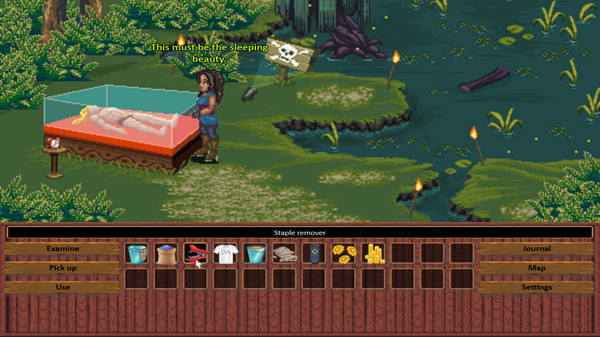
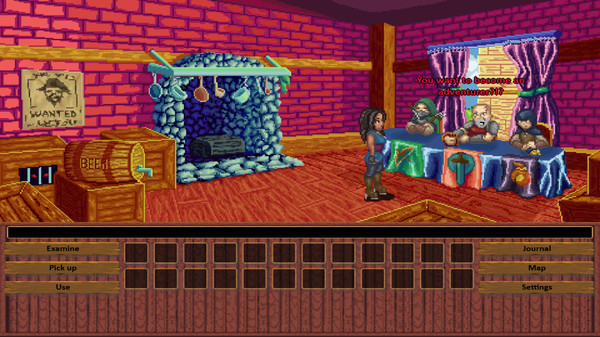
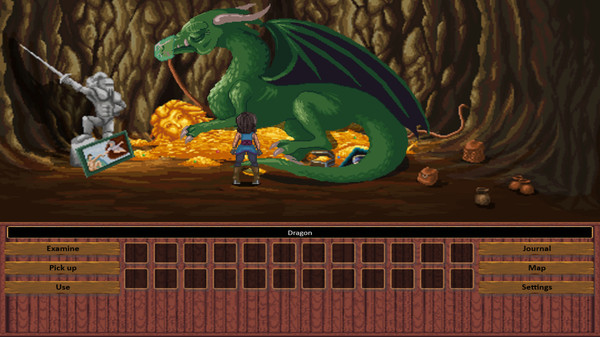
Monkeys & Dragons is an Indie Retro Adventure inspired by video game classics like Monkey Island, Indiana Jones or Simon the Sorcerer.
Story
Jack and Lana just started their honeymoon, when Jack was kidnapped by a sorcerer who turned out to be Jack's ex-boyfriend. No one wants to help Lana to rescue her husband, so she decides to take matters into her own hands. On her rescue mission, she becomes an adventurer, completes quests and solves dangerous puzzles. However, there was something she wasn't prepared for...
Content
You play as Lana and you have to rescue her husband on a tropical island full of monsters and mysteries. The Early Access version launches with three chapters that end with an open ending. All players can make suggestions for the game's ending and vote for the ending that will be integrated into the game. So, you have the possibility to contribute how the shall end. Do you want a happy ending? A tragic one? Something complete different? It is your chance to contribute to the story!
Viata
Arcane


Also:
So Jack is bissexual?Jack was kidnapped by a sorcerer who turned out to be Jack's ex-boyfriend. No one wants to help Lana to rescue her husband
LESS T_T
Arcane
- Joined
- Oct 5, 2012
- Messages
- 13,582
![The Year of Incline [2014] Codex 2014](/forums/smiles/campaign_tags/campaign_incline2014.png)
Kickstarter by ex-Telltale writer/director Mark Darin:
Darin's credits:

Nick Bounty and the Dame with the Blue Chewed Shoe is a comedic spoof on classic film noir detective movies as well as a narrative driven adventure game inspired the classic adventure games of Lucas Art and Telltale games. It's a little bit Maltese Falcon, a little bit CSI, and a little bit Naked Gun. The story follows detective Nick Bounty and his quest to be taken seriously as a real detective. As the case unfolds, he becomes entangled in an absurd mystery that threatens to end his life... and his newly hired partner's too!

The Dame with the Blue Chewed Shoe is the third game to feature Nick Bounty as the down-on-his-luck detective, but you don't need to have played either of the first two games to enjoy this one. Each game is a stand alone story to be enjoyed on its own. But that doesn't mean you shouldn't go back and enjoy those titles, and you can do it right now FOR FREE!
Download and play the first two adventures for free!

(Note: These were made WAY back in the early 2000's as Flash games and do not represent the higher quality goals of 'Nick Bounty and the Dame with the Blue Chewed Shoe'.)
Nick Bounty: A Case of the Crabs
Nick Bounty 2: The Goat in the Grey Fedora

Our target platforms at the moment are PC and Mac.
- Choose 1 of 3 sidekicks to help you solve the crime and customize your experience!
- Fully 3D characters and environments to explore.
- Built from the ground up in Unity.
- New evidence gathering/analyzing game play.
- Fully Voiced by talented voice artists.
- Jokes out the wazoo!
- *Wazoo not included.


After discovering the naked body a young business woman buried in a playground sandbox, detective Nick Bounty sets out to solve the murder of the dame with the blue chewed shoe. But a case this big is too much to handle alone, time to hire a sidekick!
Nick Bounty is sick and tired of working bottom of the barrel cases involving fake animals. He wants to be taken seriously as a crime solver. So when he obtains a police scanner that let's him get a jump on the best cases, he soon finds himself heading up a legitimate murder case!
It's not long, however, before the fish-tie wearing detective is in over his head and he'll have to hire a sidekick to boss around and make him look good... err... help him solve the case. Can Bounty and his new partner catch the murderer in time? Well, that's up to you.



Key characters:
The down on his luck, fish-tie wearing detective.
- Nick Bounty
The murder victim. A Sales Rep for a local manufacturing company that was recently made Head of Marketing. Could a jealous co-worker have bumped her off? Or could she have been involved in something more sinister?
- Sia Leyter
The coroner. He hates you. And he hates puns. This should be fun.
- Dr. MacDonald Stuffins
The potential sidekicks:
You can only hire one!
A tough as nails ex cop who doesn't follow the rules and only works alone. She's ready to hit the streets and anyone on them to track down information on the murderer.
- Emily Blackwater
One of those unofficial police psychics who claims to get into the mind of the murderer. He wants to advance his career by becoming an official psychic detective, but is he ready?
- Zachary Forsythe
He’s old. Like, could’ve been a bus boy at the Last Supper, old. A cranky old-school tough guy who doesn't take any crap, but might take a few naps here and there.
- Walter Walterman
Darin's credits:
--Tales of Monkey Island - Episode Designer, Writer, & Director.
--Sam & Max Season 2 - Episode Design. Content Programming.
--Strong Bad's Cool Game for Attractive People - Season systems lead, Episode design lead. Episode Director. Episode Writer. Content Programming.
--Puzzle Agent - Narrative design lead, System design lead, Director. Writer
--Jurassic Park - Season Systems Design - Season Design Lead, Episode Design Lead, Episode Writer.
--Walking Dead: season 1 - Episode Design lead, Episode Writer.
--Walking Dead: 400 days - Design lead. Writer.
--Walking Dead: Season 2 - Episode Design Lead.
--Tales from the Borderlands - Season Systems design. Season Design Lead. Episode Design Lead.
--Batman: Season 1 - Season Systems design, Episode Design Lead.
--Minecraft Storymode - Episode Design Lead.
--Guardians of the Galaxy - Season Systems Design, Episode Design Lead.
--Walking Dead: Final Season - Season Systems Design. Episode Design Lead.
- Joined
- May 13, 2009
- Messages
- 29,050
![The Year of Incline [2014] Codex 2014](/forums/smiles/campaign_tags/campaign_incline2014.png)


Deliver Us The Moon is set in the near future where Earth's natural resources are depleted. In an effort to solve the energy crisis, global powers created the World Space Agency and secured a promising new source of energy on the moon. The World Space Agency colonized and operated from the moon until one fateful night all communications with Earth ceased and the energy source was lost. Now, years later, you assume the role of Earth's last astronaut to go on a do-or-die mission to investigate what happened and save humanity.
During this adventure, your only companion is a small robot named ASE. Together you will traverse the moon, explore abandoned facilities, gather clues and ultimately uncover the secrets and hidden agendas that are at play. Only by relying on your wits will you have a chance at successfully delivering the moon!
Key Features:
NARRATIVE EXPLORATION
Ruins of previous lunar missions have many stories and secrets to tell.
Use your Astronaut equipment to uncover the history of the lunar colony.

NAVIGATE HAZARDS
There is no oxygen in space and malfunctioning systems litter the lunar landscape.
Surviving these hazards require an adventurer's mind.

ENVIRONMENTAL PUZZLES
The lunar bases have fallen into disrepair and have become a challenge to navigate.
Unlock tools to overcome obstacles and dangers blocking your path.

PLAY ON THE MOON
Float around in space and glide across the lunar landscape.
Experience weightless freedom and traverse the moon by foot, rover and monorail.

Warning #1: This is a walking simulator.
Warning #2: It's short, unfinished and ends without resolution of the story.
Warning #3: There are no proper character models except for the player model. Cutscenes are played out using holographic stand-ins that have vague outlines at best.
Just catch the walkthrough like I did, and see how crap this game really is.
Avoid like the plague.
LESS T_T
Arcane
- Joined
- Oct 5, 2012
- Messages
- 13,582
![The Year of Incline [2014] Codex 2014](/forums/smiles/campaign_tags/campaign_incline2014.png)
The Hand of Glory, a detective adventure inspired by Broken Sword and Gabriel Knight, from the developer of Shadows on the Vatican:
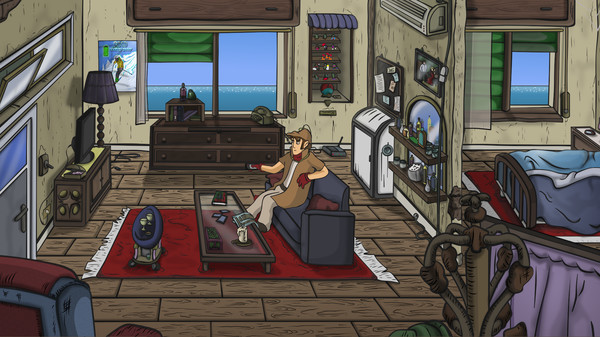
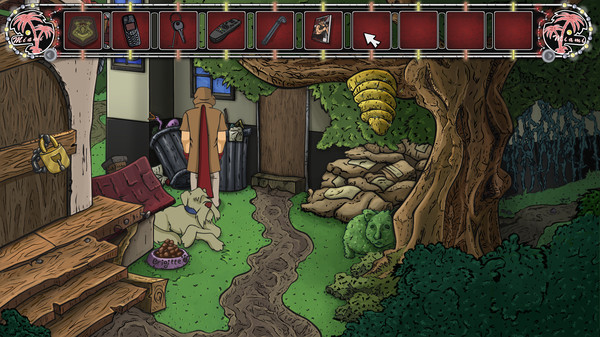
Demo is coming soon apparently.



The challenge of a dangerous serial killer plummets detective Lazarus Bundy’s career into a chasm with no way out.
In a desperate attempt at a comeback, Lazarus decides to secretly investigate the disappearance of Elke Mulzberg, the young descendant of one of the most influential families in the city.
From the sunny shores of Miami to the lush Italian hills, he will have to use all the resources at his disposal in order to reveal the truth behind the kidnapping.
And by that time he'll be past the point of no return.

Get Ready to Face A Long and Dangerous Journey.
Something obscure is crawling behind the dazzling glaze of Miami, a force that goes beyond the usual human concept of science and religion. There is a silent, latent war going on, a war able to shatter the foundations of civilization, harnessing ancient knowledge and mystical arts lost for centuries.Get ready to face a long and dangerous journey. It might be the last.

Inspired by the golden age of adventure games, especially by the Broken Sword and Gabriel Knight sagas
Find out who kidnapped Elke Mulzberg and unveil a mystery that has its roots in alchemy and esoterism
More than 15 hours of gameplay, thousands of dialogue lines and dozens of puzzles to solve
Impersonate Lars and Alice and explore Miami and Italy in wonderful 2D Full-HD locations
Original atmospheric soundtrack and full English voice-over
Demo is coming soon apparently.
LESS T_T
Arcane
- Joined
- Oct 5, 2012
- Messages
- 13,582
![The Year of Incline [2014] Codex 2014](/forums/smiles/campaign_tags/campaign_incline2014.png)
Chronicle of Innsmouth: Mountains of Madness, the second chapter of retro-inspired Lovecraftian adventure (thread for the first game):
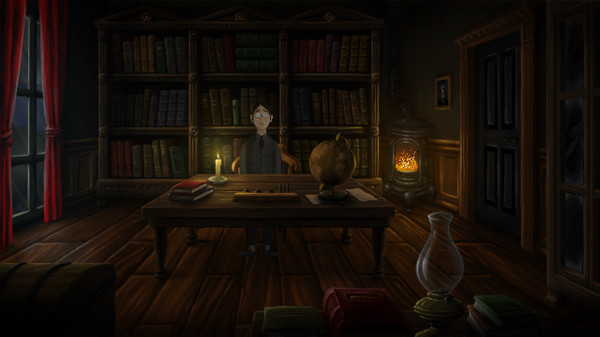
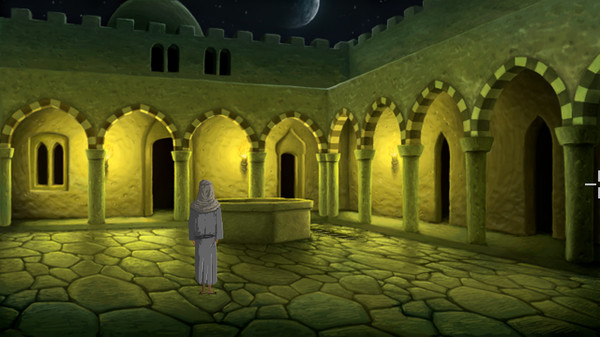
Coming to Kickstarter apparently.


Story:
Mountains of Madness is the second chapter in the "Chronicle of Innsmouth" saga.
Private Investigator Lone Carter regains conciousness to find himself lying, washed up, on a beach near Innsmouth. His body has been ripped apart. His life is coming to an end. He tries to pull his last cigarette from the pack. His arm fails to obey. As he fades away into death, terror growing in his eyes, he remembers: The encounter with the Shoggoth had, for him, been a fatal one.
An endless period of darkness ensues.
Then, some burning fire within awakens him, and he returns, completely recovered and unharmed. Ever since this rebirth, Carter has been haunted by horrible nightmares. Extensive investigations lead him to discover a proposed expedition to the South Polar regions. A team of scientists are attempting to be the first to reach there a previously unknown chain of mountains higher than the Himalayas. Within a huge cavern they discover the alien bodies of hithertofore unknown creatures frozen in the ice walls. The mountains prove to hide the ruins of an alien civilization that, having come to the earth eons before, made it their home with the aid of their shapeshifting slaves: the Shoggoths.
These events concerning Carter occur ten years before those of Chronicle of Innsmouth, the first chapter in the saga, and will influence the stories of different characters in different eras, all entwined and linked by a common thread. We will travel to ancient Yemen, playing in the role of Abdul Alhazred - "The Mad Arab", the creator of the Necronomicon - and even step into the shoes of H.P. Lovecraft himself, guiding him along the path to unveil the mysteries of his bloodline. Mountains of Madness is a graphic adventure, oozing with twisty dread, which will drag all who play it to the very limits of their sanity... and perhaps beyond.
Features:
- Play as Lone Carter, Abdul Alhazred - "The Mad Arab", and H.P. Lovecraft himself!
- Dozens of puzzles and characters to interact with, in a chilling South Polar region
- A professional atmospheric art style rendered in 640 x 480 resolution
- Everything in the hands of a massive Lovecraft geek as inspired by the master
- Original soundtrack showcasing the underlying disturbing events
Coming to Kickstarter apparently.










